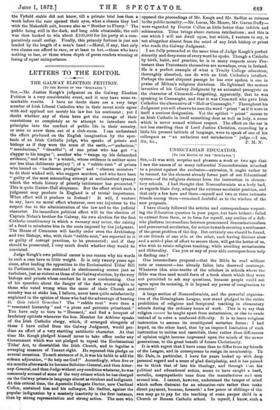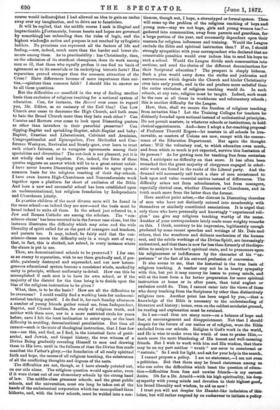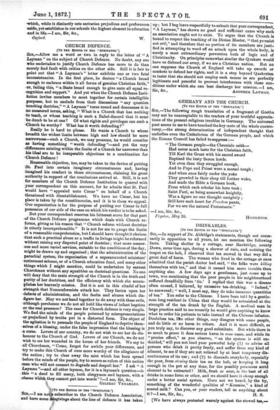UNSECTARIAN EDUCATION.
(TO THE EDITOR OF THE "EMU:TOR:1
SIR,-It was with surprise and pleasure a week or two ago that I saw the names of so many influential Nonconformists attached to a protest against the exclusion—extrusion, it ought rather to be termed, for the element already forms part of our Educational system—of the religious element from the instruction in elemen- tary schools. I had thought that Nonconformists as a body had, as regards State duty, adopted the extreme secularist position, and that only a few here and there—myself and two or three intimate friends among them—remained doubtful as to the wisdom of the new proposals.
I have closely followed the articles and correspondence respect- ing the Education question in your paper, but have hithert ) failed to extract from them, or to form for myself, any outline of a defi- nite platform intermediate between pronounced denominationalism and pronounced secularism, for action towards securing a settlement of the great problem of the day. But certainly one should be found, or our friends of one side or the other, each having distinct aims- and a settled plan of effort to secure them, will get the better of us, who wish to retain religious teaching, while avoiding sectarianism and illiberality. Can you or any of your able correspondents help in finding one ?
One intermediate proposal—that the Bible be read without note or comment—has already fallen into deserved contempt. Whatever idea nine-tenths of the scholars in schools where the Bible was thus used would form of a book about which they were not permitted to ask any questions, because people could not agree upon its meaning, it is beyond my power of imagination to conceive !
A large section of Nonconformists, and the powerful organisa- tion of the Birmingham League, now stand pledged to the entire prohibition of religious and Scriptural teaching in elementary schools during the ordinary hours of work. This is to say that religion cannot be taught apart from sectarianism, or else to evade instead of to solve a confessed difficulty. It is to leave religious instruction to assume its unmitigated sectarian forms ; I had hoped, on the other hand, that by an imposed limitation of such instruction to unities and essentials, these rather than differences of opinion might become impressed upon the minds of the newer generations, to the great benefit of future Christianity.
It is with regret that I have come thus to differ from my friends of the League, and in consequence to resign its membership. To Mr. Dale, in particular, I have for years looked up with deep personal regard and a sense of glad discipleship, and it has pained me to think that of late his theology, and through fiat his political and educational action, seems to have caught a hard, metallic, unsympathetic tone from the manufactures and men around him. I cannot, however, understand the temper of mind
which suffers distraint for an education-rate rather than make direct payment, because, forsooth ! a few pence or shillings of the stma may go to pay for the teaching of some pauper child in a Church or Roman Catholic school. In myself, I know, such a
course would indicateithat I had allowed an idea to gain an undue sway over my imagination, and to drive me to fanaticism.
It will be replied, that the middle course I seek is illogical and impracticable.1Fortunately, human hearts and hopes are governed
by something) less unbending than the rules of logic, and the
highest wisdompn action and purpose is not reached by syllogistic ladders. No premisses can represent all the factors of life and feeling,—nor, indeed, much more than the harder and lower ele- ments among them. As to practicability : has Christianity, then, on the admission of its sturdiest champions, done its work among men so ill, that those who equally profess it can find no basis of agreement as to its essentials or its underlying historic facts? Has separatism proved stronger than the common attraction of the Cross? Have differences become of more importance than uni- ties,—opinions than common faith? I should like to answer no to all these questions.
But the difficulties are manifold in the way of finding another basis than exclusion of religious teaching for a national system of
education. Can, for instance, the Record ever cease to regard you, Mr. Editor, as an emissary of the Evil One.? Can Low Church ever cease to denounce the High Church, and both cease to hate the Broad Church more than they bate each other ? Can Curates and Rectors ever cease to look upon Dissenting pastors as other than intruders in their parochial preserves? Can dipping-Baptist and sprinkling-Baptist, adult-Baptist and baby- Baptist, Erastian and Liberationist, Calvinist and Arminian, Congregationalist and Episcopalian, Free Methodist and Con- ference Wesleyan, Revivalist and Steady-goer, ever learn to trust each other's fairness, or to recognise agreements among their specialities and diversities ? The out-look is not pleasant, yet it is not wholly dark and hopeless. For, indeed, the form of these queries suggests an answer which will be to a great extent unfair. I have never known Dissenting parties unable to agree upon a common basis for the religious teaching of their day-schools. I have even known High-Churchmen and Nonconformists work together upon a platform far short of exclusion of the Bible. And here a new and successful school has been established upon an undenominational, but religious foundation by Independents and Churchmen jointly.
In practice children of the most diverse sects will be found in the same school—as indeed they are now—and the basis must be broad indeed to unite all these. In the school just referred to, a Jew and Roman Catholic are among the scholars. The "con- science-clause' has been resorted to in the former case alone, but the instance illustrates the difficulty which may arise and the wide liberality of spirit called for on the part of managers and teachers, and parents too. It may, indeed, be fairly said that the con- science-clause meets the difficulty only in a rough sort of way ; that, in fact, this is shirked, not solved, in every instance where the clause is put in use.
Then, are denominational schools to be preserved ? I for one, as an enemy to separatism, wish to see them gradually and, if pos- sible, painlessly destroyed and superseded, and our now hetero- geneous educational system become a consistent whole, marked by unity in principle, without uniformity in detail. How can this be accomplished if each sect is to have its own school, or if the majority of the district for the time being is to decide upon the bias of the religious instruction to be given ?
What, then, is to be the basis? How are all the difficulties to be overcome ? I could readily find a working basis for undenomi- national teaching myself. I do find it, for each Sunday afternoon a number of young friends gather round me, from Independent, Baptist, and Church families, for study of religious truth, and neither with them now, nor in a more restricted circle for years before, nave I felt the least inclination to enter upon, or the least difficulty in avoiding, denominational peculiarities. But then all cannot—such is the state of theological instruction, that I fear few can—see this, and find, as I find, in the historical facts of patri- archal, and Jewish, and Gospel history, the true witness of a Divine Being gradually revealing Himself to men and drawing them to His love, until in the fullness of time the Divine Son made manifest the Father's glory,—the foundation of all really spiritual faith and hope, the means of all religious teaching, the substratum of all the conflicting thoughts and dogmas of the sects.
The difficulties are not, though, as I have already pointed out, on our side alone. The religious question would again arise, even if it were thrust out of our elementary schools by the strong hand of law. The middle-class grammar schools, and the great public schools, and the universities, must ere long be taken out of the hands of the ecclesiastical corporation which has monopolized them hitherto, and, with the lower schools, must be welded into a con-
tinuous, though not, I hope, a stereotyped or formal system. Thez. will come up the problem of the religious teaching of boys an young men—may we not hope, girls and young women too ?- gathered into communities, away from parents and guardians, for a large portion of the year, and necessarily dependent upon their masters for religious influences and training. Would the League- exclude the Bible and spiritual instruction then ? If so, I should strongly sympathize with your correspondent who declared that no- conceivable penalties would ever induce him to send his boys to- such a school. Would the League divide such communities into sections, and send the clerics of the different denominations for their Scriptural education ? The prospect is simply hideous. Such a plan would carry down the strifes and jealousies and narrownesses which degrade the Church and hinder Christianity even into early youth, and in the end produce more unbelief than. the entire exclusion of religious teaching would do. In such, schools, at any rate, religion must be taught. Indeed, such must. be the case at all times in workhouse and reformatory schools ; this is another difficulty for the League.
How, then, shall we secure the freedom of religious teaching- from sectarian bias ? Let the Training Colleges for teachers be distinctly founded upon national instead of ecclesiastical principles.. Donot permit masters, in whatever schools or institutions, to hold clerical appointments. And—here I adopt a far-reaching proposal of Professor Thorold Rogers—let masters in all schools be irre- movable, as masters of Unions are now, except with the concur- rence of the Education Department. But again the thought- arises : Will the voluntary zeal, to which education owes much,. and from which so much is yet expected, survive this limitation of its powers ? As for getting men for teaching free from sectarian, bias, 1 anticipate no difficulty on that score. It has often been, remarked that the great majority of clergymen engaged in schol- astic work are found in the ranks of the Liberal party. And the- demand will necessarily call forth a class of men accustomed to look upon and value essential unities instead of differences. The difficulty arises not from schoolmasters, but from managers, especially clerical ones, whether Dissenters or Churchmen, and in, truth much more from the latter than the former.
Here another point arises,—the distrust in Dissenting churches of men who have not distinctly entered into membership with themselves or similarly constituted associations. It is urged that. only those who have personally and knowingly "experienced reli- gion" can give any religious teaching worthy of the name. Another of your correspondents lately made some weighty remarks on this. I think, contrary to his impression, legitimately enough produced by some recent speeches and writings of Mr. Dale and others, that the wondrous and delicate mechanism of the human soul, and the subtle workings of the Divine Spirit, are increasingly, understood, and that there is now far leas than formerly of the dispo- sition to analyse a brother's spiritual state, and to pronounce upone his religiousness or indifference by the character of his " ex- perience " or the fact of his outward profession of conversion.
It also seems to me, that the historical is the true basis of. religious teaching. A teacher may not be in hearty sympathy- with this, but yet it may convey its lesson to young minds, and will at the least form a far better preparation for more spiritual instruction at home or in after years, than total neglect or exclusion could do. Thus, I cannot enter into the views of those- who decry teaching from the Scriptures by other than distinctively religious men. Another point has been urged by you,—that a, knowledge of the Bible is necessary to the understanding of literature and history ; hence, even on the coldest secularist ground,. its reading and explanation must be retained.
So I am—and thus are many more—on a balance of hope and fear, of encouragement and disappointment. Not that I should despair for the future of our nation or of religion, were the Bible excluded from our schools. Religion is God's work in the world,. and Ile is wise to make even the wrath of man to praise Him,— much more the mere blundering of His honest and well-meaning friends. But I wish to work with him and His wisdom, that there may be on my part neither " wrath " nor error to counteract or- " restrain." So I seek for light, and ask for your help in the search,.
I cannot propose a policy. I am no statesman,—I am not even a politician. But that there may be found statesman among us- who can solve the difficulties which beset the question of educa- tion—difficulties from foes and unwise friends—is my earnest. desire. Oh for a Dr. Arnold—with his high spirituality, his deep, sympathy with young minds and devotion to their highest good, his broad liberality and wisdom, to aid us now !
I trust you will not despise the Hamlet-like indecision of this. letter, but will rather respond by an endeavour to initiate a policy
'which, while it distinctly sets sectarian prejudices and preferences -aside, yet establishes in our schools the highest element in education -and in life.—I am, Sir, &c.,




































 Previous page
Previous page